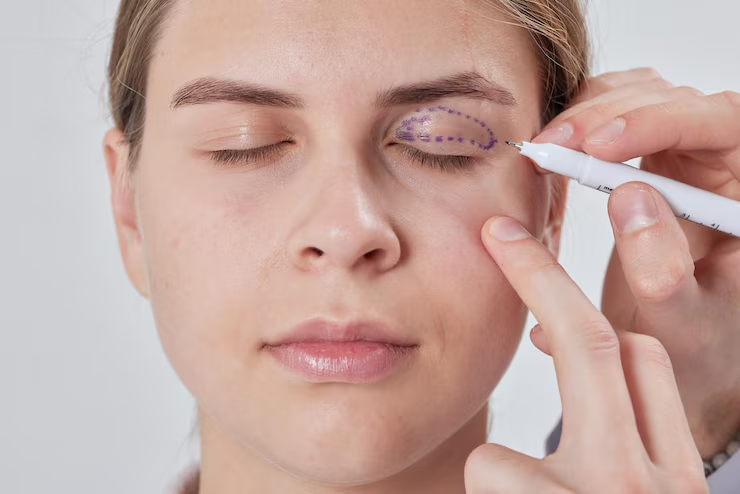Blepharoplasty, also known as eyelid surgery, is a popular procedure that removes excess skin, fat, and muscle from the upper and/or lower eyelids. Many people in Ireland choose blepharoplasty in Dublin to refresh their facial appearance, improve vision obstructed by drooping eyelids, or correct under-eye puffiness.
Like any surgical procedure, blepharoplasty carries potential risks. However, with the right surgeon and proper care, most of these risks can be minimised or avoided altogether. This article discusses the possible complications and how patients seeking plastic surgery in Dublin can reduce the likelihood of adverse outcomes.

Common Reasons for Blepharoplasty
People often undergo eyelid surgery for:
- Sagging upper eyelids that impair vision
- Excess skin creating a tired or aged look
- Puffiness or “bags” under the eyes
- Uneven or asymmetrical eyelids
Whether for cosmetic or functional purposes, blepharoplasty is among the most frequently performed plastic surgery procedures in Dublin.
What Are the Risks of Blepharoplasty?
Although blepharoplasty is generally safe when performed by a qualified surgeon, certain risks are still possible. Some may be temporary and manageable, while others could require further treatment.
Swelling and Bruising
Risk: It’s common to experience swelling and bruising around the eyes following surgery.
Avoidance: Use cold compresses as directed, avoid blood-thinning medications beforehand, and sleep with your head elevated for the first few days.
Infection
Risk: As with any surgery, infection is a possibility.
Avoidance: Follow all post-operative care instructions, keep the surgical area clean, and complete any prescribed antibiotics. Choose a clinic known for high hygiene standards.
Dry or Irritated Eyes
Risk: Some patients experience dryness, burning, or itching after blepharoplasty.
Avoidance: Your surgeon may recommend lubricating eye drops. Avoid excessive screen time or reading in the days following the procedure.
Visible Scarring
Risk: Scars can form along the incision line, which in most cases are discreetly hidden in natural eyelid folds.
Avoidance: Follow wound care instructions and avoid sun exposure. Skilled plastic surgeons in Dublin use refined techniques that minimise visible scarring.
Difficulty Closing the Eyes
Risk: Rarely, too much skin may be removed, making it difficult to close the eyes completely.
Avoidance: Choose an experienced surgeon who understands how much skin can be safely excised. Always attend follow-up appointments to monitor healing.
Asymmetry
Risk: Post-operative results may not be symmetrical, particularly if swelling varies between eyes.
Avoidance: A detailed pre-operative assessment by a trusted specialist is essential. Minor adjustments may be made after the initial healing period if needed.
Vision Changes
Risk: Although uncommon, blurred or double vision may occur temporarily due to swelling.
Avoidance: Report any vision changes immediately. These symptoms usually resolve within days or weeks with rest and monitoring.
Bleeding Behind the Eye (Orbital Hematoma)
Risk: This is a rare but serious complication that can affect vision permanently.
Avoidance: Avoid strenuous activity, bending over, or anything that increases blood pressure during recovery. Always alert your surgeon to any unusual pain or swelling.
How to Avoid Complications from Blepharoplasty
Choosing a skilled and reputable clinic is the most important factor in avoiding complications. If you’re considering blepharoplasty in Dublin, follow these steps:
Research Surgeons Thoroughly
Look for plastic surgeons with:
- Board certification
- Extensive experience in facial and eyelid surgery
- Positive reviews and testimonials
- A portfolio of before-and-after photos
Many patients in Ireland find their ideal provider at clinics that specialise in plastic surgery in Dublin, where consultation and surgery take place in safe, modern facilities.
Be Honest About Your Health
Share your full medical history, including medications, allergies, and past surgeries. Certain conditions like thyroid problems or dry eye syndrome may affect your suitability for blepharoplasty.
Follow Pre-Operative Instructions
Avoid smoking, alcohol, and any medications that could increase bleeding risk (such as aspirin or certain supplements). Your surgeon will provide a checklist to prepare your body for the safest surgery outcome.
Take Recovery Seriously
Post-operative care is vital. Your surgeon will give detailed instructions, which may include:
- Using prescribed eye ointments or drops
- Avoiding makeup, contact lenses, and eye strain
- Taking time off work and social activities
- Wearing sunglasses outdoors
Proper aftercare significantly reduces the risk of complications and helps ensure optimal healing.
When to Call Your Surgeon
While mild swelling and discomfort are normal, contact your surgeon if you experience:
- Severe pain unrelieved by medication
- Sudden swelling or bruising
- Persistent vision changes
- Signs of infection (fever, discharge, redness)
Your surgeon will assess the symptoms and take necessary action.
Is Blepharoplasty Right for You?
Ideal candidates for eyelid surgery typically:
- Are in good general health
- Do not smoke
- Have realistic expectations
- Are bothered by excess eyelid skin or puffiness
A personal consultation at a reputable plastic surgery clinic in Dublin will determine your suitability for blepharoplasty and outline what results you can expect.
Conclusion
While blepharoplasty can deliver a more youthful and refreshed appearance, it’s essential to be informed about potential risks. Fortunately, these risks are rare when performed by a qualified surgeon in a trusted clinic.
If you’re considering blepharoplasty in Dublin, take the time to research your surgeon, prepare carefully, and follow your post-op instructions. Doing so can ensure a safe experience and results that align with your aesthetic goals.

Leave A Comment